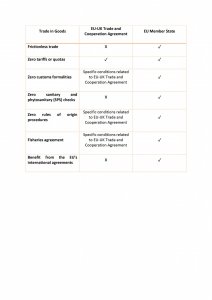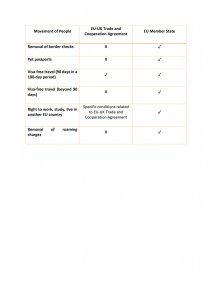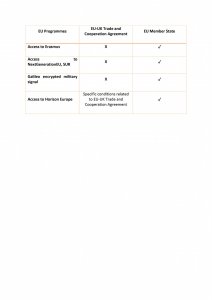Insights
Lawyers, Just Different
Q&A on The Trade and Cooperation Agreement
Introduction
On the 30th of December 2020, the United Kingdom (“UK”) and the European Union (“EU”) entered into the highly anticipated Trade and Cooperation Agreement, thus, bringing an end to a lengthy period of negotiation which was initiated back in March 2020. As of January 1st, 2021, the UK has lost the privileges it enjoyed as an EU Member State and its rights and obligations are now governed by the provisions of the Trade and Cooperation Agreement (the “Agreement”).
The Agreement covers a wide range of economic activities and lays the foundation of the future trade arrangements and cooperation between the EU and the UK allowing for preferential arrangements in such areas. Essentially, the Trade and Cooperation Agreement introduces a framework which targets the sustainable development of the EU and the UK through the maintenance of a level playing field and through the establishment of a partnership which is committed to promoting open and fair competition.
This Q&A aims to offer brief guidance on the core areas of the Trade and Cooperation Agreement and to answer some of the main questions around the mechanics of the post-Brexit Europe.
1.What is the relationship between the Trade and Cooperation Agreement and the Withdrawal Agreement?
The Withdrawal Agreement establishes the terms of the UK’s withdrawal from the EU in accordance with Article 50 of the Treaty of the European Union. It was entered into force on February 1st, 2020, and it covers, inter alia, provisions on citizens’ rights, financial settlement, a Protocol on Ireland and Northern Ireland and a protocol on the Sovereign Base Areas (SBA) in Cyprus which protects the interests of Cypriots who live and work in the SBA following the UK’s withdrawal from the EU.
The Trade and Cooperation Agreement does not replace nor supersede any part of the Withdrawal Agreement. The Trade and Cooperation Agreement is in essence a “trade agreement plus” in that it extends beyond the scope of usual EU free trade agreements. It comprises three elements (i) a free trade agreement, (ii) Citizens Security and (iii) a governance framework.
2. Are there any changes with regards to trade in goods?
The UK will no longer be part of the EU Single Market and Customs Union; thus, it will no longer benefit from the principle of free movement of goods.
The Trade and Cooperation Agreement establishes a free trade area with zero tariffs or quotas on goods and provides for the avoidance of foreseeable barriers in bilateral trade.
According to the European Commission, if the Trade and Cooperation Agreement was not achieved, products such as the ones mentioned below would be subject to significantly increased tariffs, for example:
- beef, dairy, poultry, pork, lamb, cereals, sugar and several processed foodstuffs could have faced tariffs of some 50% or above under World Trade Organization rates;
- processed fish products would have faced tariffs of up to 25%;
- cars would have also been hit by tariffs of 10%;
- textiles and footwear would be subject to tariff peaks of 12% and 17%, respectively.
The increased tariffs would burden producers and consumers causing considerable challenges to both sides. On the other hand, the Agreement not only introduces zero tariffs and quotas but also limits customs’ fees, establishes regulatory and customs cooperation mechanisms and promotes a level playing field for open and fair competition.
Trade in goods between the EU and Northern Ireland continues to be governed by the Protocol on Ireland and Northern Ireland which is included in the Withdrawal Agreement.
3. Are the provisions of the Free Trade Agreement equivalent to the those afforded to EU Member States?
Trading is governed by the Free Trade Agreement (the “FTA”) which even though it provides an ambitious cooperation with zero tariffs or quotas, it is still far from the free trade principles enshrined under the Customs Union and Single Market.
The FTA establishes certain rules and conditions that need to be satisfied in order for goods to be subject to preferential trade provisions. For example:
- businesses must prove that their goods fulfil all necessary ‘rules of origin’ requirements. This ensures that the trade preferences benefit exclusively EU and UK operators. The FTA allows traders to self-certify the origin of goods and provides for ‘full cumulation’ (meaning traders can account not only for the originating materials used, but also if processing took place in the UK or EU).
- all imports will be subject to customs formalities and will need to comply with the rules of the importing country.
- all imports into the EU must meet all EU standards and will be subject to regulatory checks and controls for safety, health and other public policy purposes.

4. Will traders have to comply with additional technical barriers to trade?
Brexit has developed two distinct regulatory systems which means that products will need to comply with and meet both UK and EU technical regulations, check and controls or other obligations.
The Trade and Cooperation Agreement aims to prevent unnecessary technical barriers arising through bilateral cooperation or by simplifying compliance procedures and providing for self-declaration of regulatory compliance for low-risk products and facilitations for other specific products of mutual interest, such as automotive, wine, organics, pharmaceuticals and chemicals. Despite attempts to cut through the red tape, it remains that UK goods entering the EU will still be subject to the EU’s onerous regulatory standards.
The EU and the UK have agreed that domestic product standards and technical regulations of the UK and EU Member States shall be compliant with common international standards, therefore ensuring a level of compatibility and harmonization. Setting international standards as the base upon which both sides shall develop their own technical and regulatory framework, is expected to reduce costs and improve efficiency. Similarly, both sides have agreed to boost market surveillance through a framework that encourages the sharing of information.
5. Will there be any changes with regards to the provision of services and investments?
The UK ceases to benefit from the four fundamental freedoms of free movement of persons, freedom to provide services, freedom of establishment and free movement of capital. Consequently, UK service providers lose their right to freely offer their services in any EU Member State(s). The EU offers the opportunity to passport services which enables authorised service providers of a Member State to passport their services in the whole of the EU. UK providers, however, will now need to comply with the specific requirements established by each Member State they wish to offer their services in.
Nevertheless, through the Trade and Cooperation Agreement, the parties target to achieve a level of openness going beyond the provisions of the WTO General Agreement on Trade in Services (GATS), to which both are parties, but while upholding that the UK is a third-country and shall not benefit from the EU’s fundamental freedoms.
6. How are service providers affected?
The Agreement removes discrimination and provides for the equal treatment of UK suppliers in the EU and vice versa.
Nevertheless, this does not erase the fact that the UK is no longer part of the Single Market and as such, UK service providers will have to comply with host-country rules in each Member State and will no longer benefit from the country-of-origin principle, mutual recognition (e.g. of professional qualifications) or passporting rights for financial services.

7.How is the free movement of professionals affected?
The free movement of professionals will undoubtedly be affected since the Agreement does not include a chapter on mobility. Consequently, the UK has elected a hard Brexit with regards to the freedom of movement of professionals.
Nonetheless, provisions for the facilitation of short-term business trips and temporary secondments of highly skilled employees have been made. The arrangements are focused on the temporary movement of persons for business purposes enabling companies to transfer certain employees, as intra-corporate transferees, to work in an associated company located in the other country. The maximum duration of such transfers is capped at three years. With respect to UK nationals transferred to the EU, this duration includes periods of mobility between Member States.
Arrangements have also been made with regards to contractual service suppliers or independent professionals in order to enable movement for the supply of services, so long as they comply with UK and EU rules.
8.Will UK qualifications continue to be recognized across the EU?
Professionals holding a UK qualification benefitted from automatic recognition in the EU and were able to offer their services in any Member State.
As of January 1st, citizens with qualifications acquired in the UK will need to have their qualifications recognised in the Member State in which they operate. However, the Trade and Cooperation Agreement foresees a mechanism whereby the EU and the UK may later agree, on a case-by-case basis and for specific professions, on additional arrangements for the mutual recognition of certain professional qualifications.
9.What does that mean for EU lawyers?
EU lawyers will be permitted to offer legal services which relate specifically to international law or the law of the country of their authorization in the UK and vice versa.
10.Does the Trade and Cooperation Agreement cover the provision of financial services?
The Trade and Cooperation Agreement includes terms for financial services which make clear the fact that UK financial services providers no longer enjoy the same rights that were afforded to them when the UK was an EU Member State.
The Agreement aspires to maintain both the EU and UK markets open for operators of either side. The parties have agreed that internationally agreed standards in the financial services sector will be complied with and implemented in their territories. The EU and the UK have further committed that by March 2021 a Memorandum of Understanding establishing a framework for regulatory cooperation on financial services will be achieved.
11.How will financial services providers be affected?
Financial services can no longer be passported, meaning that providers of such services cannot freely provide services on a cross border basis and/or benefit from the freedom of establishment across the EU.
The UK is now considered a third country and therefore, financial firms authorized in the EU will need to seek authorization in the UK before being able to offer their services there. Similarly, the provision of services by UK firms into the territory of a Member State will be subject to local legislation, which may require the authorisation of the UK firm in the respective Member State.
12.Are there any equivalence decisions on financial services?
EU law provides that in some cases, third-country firms are permitted to provide certain services into the EEA on the basis of “third country equivalence”, meaning that it has been deemed by the European Commission that the relevant regulatory framework in that specific third country is equivalent to the EU standards.
Two equivalence decisions have been issued so far. The first decision relates to derivatives clearing, which is valid for 18 months from the date in force and the second is in relation to securities depositaries which is valid for 6 months from the date in force.
13.How can UK investment firms offer investment services in Cyprus?
As per CySEC’s Q&A on Brexit, the provision of investment services in Cyprus to elective professional clients, on a solicited basis requires the establishment of a branch.
The provision of investment services (including the performance of investment activities) in Cyprus by UK firms to professional clients and to eligible counterparties, is governed by MiFIR. In the absence of an equivalence decision by the European Commission and a subsequent registration of third country investment firms with ESMA which will allow the third country investment firms in question to provide investment services solely to per se professional clients and to eligible counterparties across the EU on a solicited basis, national rules apply. Cyprus’s rules provide that a branch must be established in such cases. However, CySEC has launched a Temporary Permission Regime for UK firms that do not have a physical presence in Cyprus and provide investment services to per se professional clients and to eligible counterparties on a solicited basis.
14.Will UK investment firms’ branches established in Cyprus be permitted to passport their services across the EU?
No. UK firms’ branches may not provide investment services into other EEA Member States. For the provision of investment services on a cross border basis to residents of other EEA Member States, it is a prerequisite that a different legal entity fully authorised and regulated by the relevant regulatory authority is established.
15.Does reverse solicitation trigger authorization requirements?
No. Reverse solicitation does not trigger the requirement to obtain authorization. Therefore, a UK firm offering investment services to retail clients, elective professional clients, per se professional clients and eligible counterparties on a reversed solicitation basis does not need to be authorized in the relevant EU Member State.
16.What happens to the authorization of a UK investment fund manager or UK fund manager authorized as a UCITS management company pursuant to the provisions of the UCITS Directive?
Regardless of having been authorized under the UCITS Directive, UK entities cannot offer their services in the EEA or manage UCITS established in the EEA. The regulatory brands ‘UCITS’ and ‘UCITS management company’ are reserved only to entities subject to the laws of EEA Member States. Consequently, a UK investment fund manager cannot be considered as a UCITS management company and is thus not an eligible manager of any UCITS, including a Cypriot UCITS.
17.Can a UK authorized investment fund manager manage CY AIFs?
The AIF Law provides that AIFs can be managed by AIFMs, MiFID Firms and UCITS Management Companies.
As mentioned under question 16 above, UK entities can no longer be considered UCITS Management Companies nor MiFID Firms.
However, with regards to AIFMs, the AIF Law provides that the term AIFM also includes a non-EU AIFM. Namely, a non-EU AIFM is an AIFM not being an EU AIFM, including thus a UK investment fund manager. However, this is subject to Cyprus being the Member State of reference of the non-EU AIFM as per Article 49 of the AIFM Law. The activation of Article 49 of the AIFM Law requires the introduction of the AIFMD ‘third-country passport’ and until this is achieved, UK fund managers cannot manage CY AIFs.
Similarly, Registered AIFs (RAIFs) can be managed by a UK AIFM so long as such AIFM possesses the AIFMD ‘third-country passport’ which as mentioned above, has not yet been introduced.
18.How does the management of AIFLNPs differ?
The AIF Law places no restriction on UK fund managers other than the requirement for a (local) authorization ‘to provide the portfolio management service’ and to be subject ‘to prudential regulation regarding the provision of this service’. Hence, a licensed UK fund manager is an eligible external manager for CY AIFLNPs.
19.Is digital trade covered by the Trade and Cooperation Agreement?
The Agreement seeks to facilitate digital trade through the removal of unjustified barriers, the enhancement of personal data protection and the prohibition of data localisation requirements.
20.Will EU firms be permitted to bid for UK sector contracts?
EU entities will be allowed to participate on an equal footing with UK entities in bids for procurement tenders covered by the Agreement, and vice versa. The Agreement further provides that EU companies established in the UK (and vice versa) shall not be subject to discrimination with regards to small-value procurement, i.e. below the threshold of the GPA (from EUR 139,000 to EUR 438,000, depending on the contracting entity, and EUR 5,350,000 for construction services).
21.Are there any changes introduced in the energy sector?
The EU and the UK are strongly interconnected when it comes to energy. The UK is currently a net importer of energy, with the EU currently providing some 5-10% of its electricity supply and 12% of its gas needs.
By leaving the EU, the UK has abandoned its Single Market benefits and the EU’s internal energy market. The EU offers not only financial support to EU Member States to develop and deploy energy related measures but also access to programs such as the EU’s Emissions Trading Scheme or the European Atomic Energy Community. The UK has now ceased to be part of such initiatives.
Nevertheless, the Trade and Cooperation Agreement aims to maintain the energy flow between the two sides through new trading arrangements and a framework of cooperation. These arrangements promote the maintenance of a level playing field and focus on the use of renewable energy and tackling climate. The EU and the UK have also agreed and put in place provisions for the safe and peaceful use of nuclear energy.

22.How will energy trading take place going forward?
The UK will have to trade with the EU on third-country terms. Due to the strong links regarding energy between the parties, however, the Agreement provides for separate arrangements for trade over interconnectors, based on a coupling model.
This model should still allow the maximisation of benefits for both the EU and the UK in the trade of electricity over interconnectors. The Agreement also includes:
- provisions guaranteeing non-discriminatory access to energy transport infrastructure and a predictable and efficient use of electricity and gas interconnectors.
- a new framework for cooperation between EU and UK Transmission System Operators (TSOs) and energy regulators.
- provisions regulating subsidies to the energy sector to ensure they will not be used to distort competition.
- provisions committing the EU and UK to ensuring the security of supply until new interconnections become operational.
23.Will the UK be subject to EU climate change initiatives?
The UK will not be obliged to follow the EU’s climate change targets and policies. Nevertheless, the Agreement sets a common framework for cooperation in the fight against climate change.
The Agreement provides that the 2015 Paris Agreement on climate control is of paramount importance and that any violation gives the other party the right to terminate or suspend all or parts of the Agreement. As a minimum, the Agreement aims to maintain the current level of climate protection in the EU and in the UK while at the same time, both sides have committed to improving and increasing their respective levels of protection in the future.
24.How is transportation affected by Brexit?
Each year, around 210 million passengers and 230 million tonnes of cargo are transported between the EU and the UK. Prior to Brexit, the transport service operators worked freely on the basis of a single licence or authorisation and without being burdened by border checks and controls. By leaving the EU, the UK will no longer benefit from the free movement of people and goods that is afforded to EU Member States.
This means that transport businesses will be required to comply with EU and UK certification requirements respectively and be hindered by the additional formalities required when crossing the UK-EU border. Moreover, the UK will no longer be a member of the EU Aviation Safety Agency (EASA) and therefore, it will have to build up its own capacity for aviation safety purposes.
25.How does the Trade and Cooperation Agreement treat transport?
The Agreement seeks to alleviate the UK’s departure by introducing certain arrangements which even though are nowhere near the advantages afforded by EU membership, they somehow maintain some of the links between the EU and the UK.
The Agreement ensures continued air, road and maritime connectivity by establishing the terms and conditions upon which air transport operators, road haulage and passenger bus operators, as well as maritime transport operators will be performing their services. Furthermore, it provides for a common framework for aviation safety, transport safety, worker and passenger rights and environmental protection. It is evident through the terms of the Agreement that ensuring a level playing field for both sides with regards to transportation is a key priority.
26.Are air carriers’ rights affected?
As of 1 January 2021, the UK will no longer be considered as an EU carrier and consequently, UK airlines will lose several of their rights regarding EU airspace.
The Agreement provides that EU and UK carriers will be able to fly across the territory of the EU without landing, make technical stops in the territory of the EU for non-traffic purposes and perform unlimited carriage of passengers and cargo between the EU and the UK. Onward carriage will be possible for the carriage of cargo to/from a third country if Member States agree this bilaterally and reciprocally with the UK.
However, UK carriers lose their right to transport passengers or cargo between two points in the EU or perform onwards carriage services between the UK and two other Member States. In addition, UK carriers will no longer be permitted to carry passengers onwards between the UK, a Member State and a third country.

27. Do air carriers need to comply with any additional requirements?
UK air carriers will have to meet certain conditions, including holding a valid licence from the UK’s competent authorities, having their principal place of business in the UK and being majority UK-owned and controlled. UK carriers that are majority UK/EEA and/or Swiss owned and controlled at the end of the transition period may also continue to operate. Similar conditions apply to EU carriers while they will still need to maintain compliance with EU requirements on EU/EEA/Switzerland majority ownership and control.
28.How will the rights of EU passengers be affected?
EU air passenger rights will continue to apply to flights operated from the UK to the EU by an EU airline, or to flights operated from the EU to the UK, whether operated by an EU or a UK airline. However, EU air passenger rights will not apply to UK-operated flights from the UK to the EU.
29.How will the rights of road hauliers be affected?
The Agreement provides for quota-free point-to-point access for operators transporting goods by road between the EU and the UK. This means UK lorries would be able to reach the EU and return from the EU, including when not loaded. The same rights are conferred to EU hauliers travelling from any point in the EU to the UK, and back from the UK to anywhere in the EU.
UK and EU trucks will also be able to perform up to two additional operations in the other party’s territory once they have crossed the border. This will allow hauliers that carry a load to the other party’s territory to perform two cabotage operations, thus limiting the risk of having to travel back without a load. For UK hauliers, these additional operations can be composed of two cross-trade operations or one cross-trade and one “cabotage” operation.
The Agreement also provides for full transit rights across each other’s territories (to reach third countries or other parts of their own territory).

30. Are there any changes with regards to visas for short-term visits?
The UK has put an end to the free movement of persons between the EU and the UK. All movements will now be subject to the EU’s and UK’s existing immigration legislation applicable to all third country nationals. Persons who were or had been already in a cross-border situation between the EU and the UK before the 1st of January 2021 are covered under the Withdrawal Agreement, which allows for their continued right to remain, ensures non-discrimination and protects their social security rights.
31. Will visas be required for travelling between the EU and the UK?
The Agreement does not include any provisions on mobility or on the facilitation of short-term visits or long-term stays. The only exception relates to the temporary movement of natural persons for business purposes, which has been covered in previous questions. Therefore, the Agreement does not govern or cover the right to enter, work, reside or stay of citizens of one party to the territory of the other.
The parties, however, have agreed on a number of measures regarding social security coordination. These arrangements aim to protect the rights of citizens of one party temporarily staying in, moving to or working in the territory of the other.
The EU has agreed to permit UK nationals short-term visa-free visits of up to 90 days within any 180-day period. However, the EU’s decision is conditional upon the UK continuing to provide for equal visa-free travel for short-term visits for EU citizens, without discrimination between EU nationals.
32. How are long-term stays going to be treated?
UK nationals intending to stay in the EU for periods exceeding 90 days for any purpose, will be able to do so under the conditions for entry and stay for third country nationals set under EU law and the national laws of the Member State they intend to stay in. Similarly, EU citizens intending to move to the UK will need to comply with the applicable immigration conditions set by the UK government.

33.How are jurisdiction principles going to be applied in the UK?
Jurisdiction principles with regards to the EU region are mainly governed by the Brussels Regime (which applies to EU Member States) and the Lugano Convention (which applies between EU Member States and EFTA states). By leaving the EU, the UK will no longer be subject to these principles. This could ultimately result in multiplicity of actions and lack of judgement harmonization.
34.Does the UK remain a contracting state to the Hague Convention?
Yes. The UK remains a contracting state to the Hague Convention. However, for the Hague Convention to apply:
- There must be an agreement in place between the parties to the dispute containing an exclusive choice of court agreement.
- The choice of court agreement must have been entered into after the accession date (i.e. after the 31st of December, 2020).
- Only judgments on the merits are covered. It is not therefore possible to seek enforcement of interim rulings as would be the case under the Brussels Regime.
- The subject matter of the proceedings must come within the scope of the Hague Convention.
However, if neither party is domiciled in a non-EU contracting state, then the Brussels Recast gets priority. This could mean that exclusive jurisdiction clauses stating that English courts shall have exclusive power, could be deemed ineffective in cases where both parties are EU domiciled.
35. Will UK judgements be recognized across the EU?
As mentioned above, the UK has ceased to be a party to the Brussels Regime and the Lugano Convention. As a result, the recognition and enforcement of UK judgements across the EU will depend on the national rules of each Member State. For example, countries such as Cyprus, which follow common law, do not facilitate the recognition nor enforcement of judgements which are not final or are non-monetary.
36. Does the same apply to arbitration proceedings?
No. The EU and the UK are contracting states to the New York Convention on the Recognition and Enforcement of Foreign Arbitral Awards. Therefore, no changes will take place with regards to arbitration. Ultimately, this could lead to arbitration becoming a more appealing option for dispute resolution.
37. How are governing law clauses affected?
The Rome I and Rome II Regulations have been incorporated into UK national law and therefore, the law specified in a contract shall be applied. However, non-EU courts will refer to their national rules in deciding whether to recognise governing law clauses.
38. What happens to existing contracts entered into prior the 1st of January 2021?
Parties to contracts entered into before the 1st of January 2021 and having England as the agreed jurisdiction may face some issues. There are numerous ways for such parties to address some of the uncertainty currently existing, including by restating or re-executing any jurisdiction clauses and ensuring that an exclusive jurisdiction clause that is not asymmetrical or unilateral is established. This way the parties would ensure that the provisions of the Hague Convention will apply. On the other hand, the parties could simply amend contracts so as to include a different jurisdiction that is within the EU. Alternatively, parties could include clauses which provide for the use of alternative dispute resolution mechanisms.
39. Will any changes take place with regards to service of proceedings?
The EU Service Regulation shall apply to all documents received prior to the 31st of December 2020. For all other documents, the Hague Service Convention will apply as between the UK and EU Member States. Similarly to the EU Service Regulation, the Hague Service Convention provides that each contracting state appoints a “Central Authority” as responsible for receiving and executing requests for service originating in other contracting states.
40. Will the EU and UK continue to exchange evidence?
The Taking of Evidence Regulation shall apply to all requests for evidence received prior to the 1st of January 2021. This allows for direct contact between courts of Member States through a standardised request form. However, following the 1st of January 2021, the Hague Evidence Convention shall apply which is characterized as a less straightforward process for parties seeking to request evidence.
41. Will the UK continue to participate in EU programmes?
Following Brexit, the UK loses its right to participate in any EU programmes. However, the EU may allow the UK to participate in EU programmes when deemed in the interests of the EU. Each program sets clearly defined conditions for participation and the rules governing such participation. The Multiannual Financial Framework 2021-2027 also provides detailed provisions for EU programmes participation.
In recognition of the mutual interests of the EU and the UK, the UK shall continue its participation in Horizon Europe, the Euratom Research and Training programme, the fusion test facility ITER, Copernicus, as well as access to the EU’s Satellite Surveillance & Tracking (SST) services.

The foregoing should not be read or construed or relied upon as legal advice in any specific or individual circumstance.

